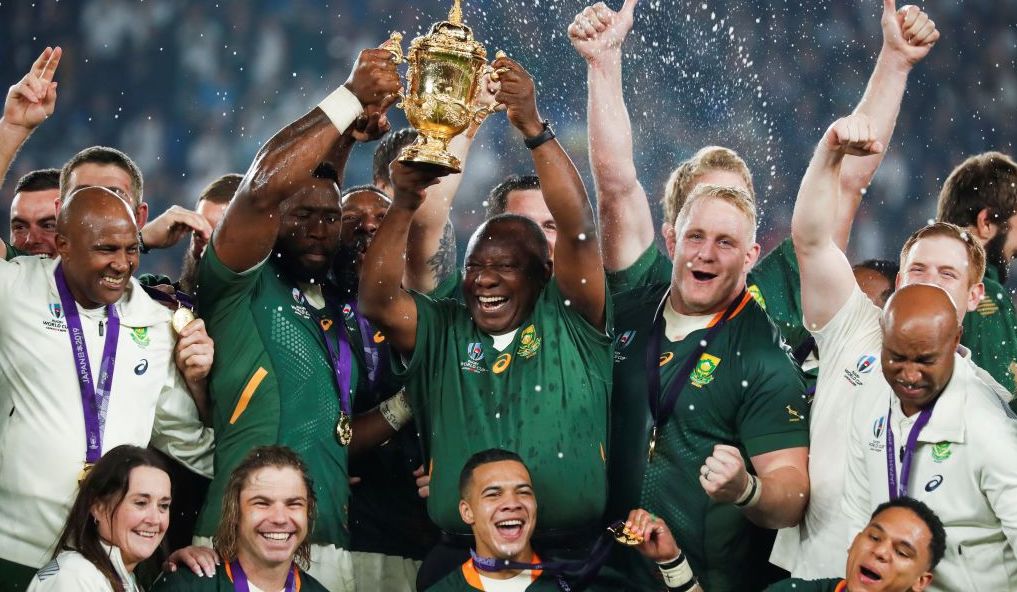Rassie Erasmus learned from his predecessors’ mistakes regarding transformation and built the most diverse Springbok team after just 18 months in the job, writes JOHN GOLIATH.
During Allister Coetzee’s first Springbok squad announcement in May 2016 he glowingly talked about young flyhalf Garth April’s selection in the team after players such as Handre Pollard and Robert du Preez were not considered because of injury.
April was one of 13 black players in the Boks 31-man squad for the three-Test series against Ireland. Coetzee received very good reviews for his squad, as he tried to restore some of the damage done by some of Heyneke Meyer’s selections the year before, when a Bok team lost a Test to Argentina in Durban with just wing Bryan Habana and Zimbabwean-born prop Tendai Mtawarira in the starting lineup.
ALSO READ: Hats off to Rassie Erasmus
‘And I think it’s important to note that one shouldn’t be scared to expose your young flyhalves early at that level. Because when New Zealand do it and bring a [Lima] Sopoaga to Ellis Park and they play against the Boks and they win the Test, then it’s really great from the New Zealanders. And we are actually scared to do that,’ Coetzee said.
‘This boy’s got the ability to do it, and I was never going to select an overseas-based 10 to be a third flyhalf for South Africa. That’s how serious we are at SA Rugby to make sure that we do give our younger players an opportunity to come through.
‘And you know what, Naas’ expression, “If you’re good enough, you’re old enough” … and I think he’s good enough.’
However, when first-choice flyhalf Pat Lambie was concussed by Irish flank CJ Stander in the first Test at Newlands, Coetzee brought in veteran flyhalf Morne Steyn straight on to the bench for the second and third Tests as backup for Elton Jantjies.
April, despite top performances for the Sharks against New Zealand Super Rugby teams in New Zealand, never got to play a Test during that period. His confidence seemed to take a massive knock after that, and he hasn’t been quite the same since then.
There were many other instances where Coetzee got it wrong in terms of his player management. In 2017, ahead of a Test against Australia in Bloemfontein, he publicly backed Raymond Rhule at a media conference, before sending the wing back to his union to work on his tackling the following day.
ALSO READ: Kolbe: Rugby is a game for every player
It would be in the same week he publicly criticised Francois Hougaard’s scrumhalf play, saying it’s not up to ‘international standard’. Hougaard, who subsequently retired from international rugby, later told friends Coetzee never actually had a conversation with him about his shortcomings.
Erasmus, though, definitely learned from Coetzee’s mistakes when it came to player management and the need to put together a Springbok team that was fully transformed, but also one that could compete with the best teams in the world.
Erasmus, at his very first media conference as Bok boss, said that transformation is non-negotiable. He backed the players he picked and gave them confidence to play to their undoubted potential.
He appointed Siya Kolisi as the Boks’ first black captain, while he also backed black youngsters such as Aphiwe Dyanti, Sbu Nkosi, Lukhanyo Am, Cheslin Kolbe and Damian Willemse. These players blossomed over the last 18 months, while front-row forwards Trevor Nyakane and Bongi Mbonambi took their respective games to the next level.
Who would have imagined that there would be such a fierce debate about who should be the Boks’ starting hooker a few years ago, or that Nyakane would go into the World Cup as South Africa’s premier tighthead prop? Who could have predicted that young Herschel Jantjies would be on a bench in a World Cup final?
Honesty was the key here for Erasmus. The players always knew what was expected of them and they knew where they stood with the coach.
‘We live in a very unique country and to have someone like Rassie who doesn’t shy away from the challenges of the country … he is a very honest guy,’ assistant coach Mzwandile Stick, who also worked under Coetzee in 2016, told the media in 2018.
ALSO READ: Boks’ class and confidence
‘He doesn’t play hide-and-seek about stuff.’
That trust breeds unity and a great team environment. Rassie put his faith in abilities of the black players he picked, and they repaid him with the Webb Ellis Cup.
Erasmus understands that transformation isn’t just about picking a black player above a white player for the sake of it. It’s about giving the black player an equal opportunity to show that they can compete with the best in the world.
Coaches such as Coetzee and Meyer helped fuel the narrative that black players are inferior to their white counterparts. It’s why black players have always felt that they need to play twice as hard to be recognised as equals.
But that burden has been lifted by Erasmus. No longer is there a need for a Mbonambi and Nyakane to feel like they have to play well because they are regarded as ‘quota’ players. They are currently actually two of the world’s best players in the front row.
Erasmus had changed the face of Springbok rugby forever. Surely now, we are #StrongerTogether.
Photo: Odd Andersen/AFP via Getty Images




